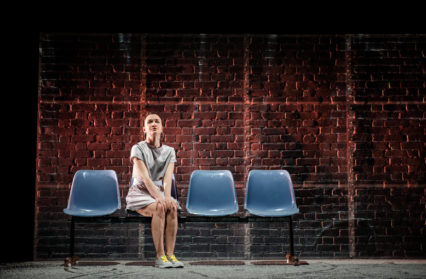Caragh Medlicott reviews the latest monologue from National Theatre Wales, Cotton Fingers by Rachel Trezise.

Cotton Fingers flips the conventional definition of drama; a sparse plot is electrified with life through the intensity of its emotional landscape. Abridged, Cotton Fingers is about abortion in Northern Ireland – realised, it’s a confrontation of issues so complex and layered they make the head spin. Aoife (Amy Molloy) is pregnant; barely 20 and itching to break out of her council estate in Belfast, this is an unspeakable disaster. The narrative is batted between an abortion clinic in Wales and the events which have led her to this position. A one-woman show, the play fits loosely into the framework of a coming-of-age tale but also tests the boundaries of a traditional bildungsroman. This isn’t just about personal growth, but survival, the navigation of trauma.
Waiting is a thing of torment in Rachel Trezise’s story – Aoife is waiting for her period, her pregnancy results, her travel funds, her plane, her train, her next pill. This is fitting as a reflection of the real obstacles facing women in Northern Ireland, but also as a tribute to Aoife’s own state of purgatory and self-punishment. Director Julia Thomas breathes life into this sense of limbo from the play’s first moments; Aoife walks onto stage and paces for a drawn-out minute before finally beginning to speak. On stage, there is nothing but a short row of clinical waiting room chairs set against a faux-brick wall and a floor covered in fake snow. Aoife pushes the seats about the stage, swirls them and lifts them – sometimes laboriously – and then clambers around them in whichever way best fits the scene. While the movement can feel unnecessary, the effect of the messy scraped lines left in the layer of snow is worth it; by the end, the stage is scarred with the experience of Aoife’s tale.
Aoife gets pregnant after visiting her boyfriend, Cillian, on Boxing Day. A lazy evening of intimacy and cheese toasties soon conspires into Aoife’s worst nightmare. The role her boyfriend plays in the narrative is significantly minimal. Near the play’s end, Aoife briefly encounters Cillian a final time; his unwitting obliviousness after her substantial struggle points glaringly to the fundamental inequality of gender experience.
Cotton Fingers’ flashbacks hover around this festive period – a commendable decision on Trezise’s part; the smothering religious imagery of the virgin birth is obvious, yet effective. Aoife’s personal experience conveys the complexity of social, political and religious pressures blurred together; for her, these aren’t distinct, separate areas, but an all-encompassing reality.
The play’s exploration of the desperation that coincides with an unwanted pregnancy is poignant. Aoife lists the abortion techniques used by women the world over: drinking too much alcohol, throwing themselves downstairs, using coat hangers and pouring scalding water – these things, she now understands. Aoife sees the symptoms of an anti-abortion nation everywhere – from the abortion clinic ads crossed out in magazines, to her mother’s continual recital of a fabled family tale whereby her sister’s abortion yields a tragic end. The weight of this conditioning really presses on Aoife after she has left the clinic; she expected relief but instead suffers not just immense guilt, but confusion, frustration at her own shame. “I saw the abortion as a hurdle,” she tells the audience – instead, she discovers it’s “an experience” – one that has to be lived, not avoided.
In one of the play’s most anticipated scenes, we see Aoife react to the results of Ireland’s abortion referendum while watching TV with her mum. It’s an optimistic moment, yet, the taste is bittersweet. The initial buzz of this victory is swept up by Brexit drama, which, in itself, throws Northern Ireland’s own abortion laws into limbo. In light of recent events, Cotton Fingers has become even more socially significant. With women’s reproductive rights being stripped back as new abortion legislation sweeps the US, Trezise’s story hits an uncomfortable, but sadly relevant, note.
Cotton Fingers by Rachel Trezise is on at Sherman Theatre in Cardiff until June 8th.
For more Wales Arts Review coverage of National Theatre Wales, including news, reviews, and interviews, click here.
(Image credit: Craig Fuller)


 Enjoyed this article? Support our writers directly by buying them a coffee and clicking this link.
Enjoyed this article? Support our writers directly by buying them a coffee and clicking this link.








